Traditional Chinese Medicine (TCM) believes that the spleen and stomach are the “foundation of postnatal life,” and there is a saying that “injuries to the spleen and stomach lead to a hundred diseases.” The famous Ming dynasty physician Zhang Jingyue also proposed that “health preservation should prioritize the spleen and stomach,” referring to them as the body’s foundation and axis, highlighting their importance.The spleen is responsible for transforming and transporting nutrients from food, distributing fluids, and regulating blood, while the stomach is our largest digestive organ. When the spleen and stomach function poorly, the body may experience malnutrition and disharmony of qi and blood, leading to poor complexion, weak body, and unhealthy skin.
Therefore, managing the spleen and stomach is crucial. Below, I will discuss the management of spleen and stomach diseases, including corresponding acupuncture points, foods, and more.
1. Functions of the Spleen and Stomach
Problems with the spleen and stomach not only affect appetite, sleep, and emotions but can also lead to organic diseases over time. Conversely, a well-functioning spleen and stomach can ensure sufficient qi and blood in the body, allowing all organs to function smoothly.More importantly, a healthy spleen and stomach can lead to longevity. A study conducted in Israel involving 1,258 elderly patients aged 70-82 found that after excluding factors such as physical activity, demographics, and nutrition, elderly individuals with healthy spleens and stomachs and good appetites had a lower risk of mortality.2. Serious Issues with Spleen and Stomach Diseases The spleen prefers dryness and dislikes dampness; the stomach prefers regularity and dislikes stimulation. However, in the fast-paced modern lifestyle, unhealthy habits such as drinking alcohol, binge eating, consuming cold and pickled foods, sedentary behavior, and anxiety have placed additional burdens on the already weak spleen and stomach. TCM believes that the spleen has the characteristics of “earth,” which easily absorbs moisture, making it vulnerable to dampness. Most modern individuals experience “spleen dampness” issues. Additionally, data shows that there are approximately 120 million patients with gastrointestinal diseases in China, with over 70% being middle-aged and elderly individuals, commonly suffering from chronic gastritis and peptic ulcers, with incidence rates of 30% and 10%, respectively.3. Manifestations of Spleen and Stomach Issues1Yellowish ComplexionA dull yellow complexion may indicate spleen deficiency, primarily manifested as poor appetite, abdominal distension after meals, and symptoms of diarrhea or loose stools. If not treated promptly, the complexion may gradually turn “withered yellow,” characterized by yellow cheeks and emaciation, due to insufficient qi and fluids from the spleen, which cannot provide adequate nutrition to the body. In contrast, “yellow and swollen” refers to a yellow complexion with edema.2Dull Nose TipTouching the tip of the nose reveals a small depression, which is the area that reflects the physiological function and pathological changes of the spleen most clearly. If the nose tip is red, it indicates heat in the spleen and stomach, characterized by a strong appetite but easy hunger after eating, poor digestion and absorption, and a bitter, sticky mouth.3Pale and Dry LipsThe “Huangdi Neijing” states, “The lips are the orifice of the spleen,” meaning that issues with the spleen and stomach will manifest on the lips. Yang Li states that generally, individuals with good spleen and stomach health have rosy, moist, and smooth lips. Conversely, if a person’s lips are dry, peeling, and colorless, it indicates poor spleen and stomach health.4Drooling During SleepThe “Huangdi Neijing” also states, “The spleen governs saliva,” which is the external manifestation of the spleen’s fluids and qi. When a person’s spleen qi is sufficient, saliva can be properly transported, aiding in swallowing and digestion, and will remain in the mouth without overflowing. If the spleen qi is weak, the saliva will not behave properly, leading to drooling during sleep. If drooling occurs frequently, one can start by tonifying the spleen for adjustment.
The spleen prefers dryness and dislikes dampness; the stomach prefers regularity and dislikes stimulation. However, in the fast-paced modern lifestyle, unhealthy habits such as drinking alcohol, binge eating, consuming cold and pickled foods, sedentary behavior, and anxiety have placed additional burdens on the already weak spleen and stomach. TCM believes that the spleen has the characteristics of “earth,” which easily absorbs moisture, making it vulnerable to dampness. Most modern individuals experience “spleen dampness” issues. Additionally, data shows that there are approximately 120 million patients with gastrointestinal diseases in China, with over 70% being middle-aged and elderly individuals, commonly suffering from chronic gastritis and peptic ulcers, with incidence rates of 30% and 10%, respectively.3. Manifestations of Spleen and Stomach Issues1Yellowish ComplexionA dull yellow complexion may indicate spleen deficiency, primarily manifested as poor appetite, abdominal distension after meals, and symptoms of diarrhea or loose stools. If not treated promptly, the complexion may gradually turn “withered yellow,” characterized by yellow cheeks and emaciation, due to insufficient qi and fluids from the spleen, which cannot provide adequate nutrition to the body. In contrast, “yellow and swollen” refers to a yellow complexion with edema.2Dull Nose TipTouching the tip of the nose reveals a small depression, which is the area that reflects the physiological function and pathological changes of the spleen most clearly. If the nose tip is red, it indicates heat in the spleen and stomach, characterized by a strong appetite but easy hunger after eating, poor digestion and absorption, and a bitter, sticky mouth.3Pale and Dry LipsThe “Huangdi Neijing” states, “The lips are the orifice of the spleen,” meaning that issues with the spleen and stomach will manifest on the lips. Yang Li states that generally, individuals with good spleen and stomach health have rosy, moist, and smooth lips. Conversely, if a person’s lips are dry, peeling, and colorless, it indicates poor spleen and stomach health.4Drooling During SleepThe “Huangdi Neijing” also states, “The spleen governs saliva,” which is the external manifestation of the spleen’s fluids and qi. When a person’s spleen qi is sufficient, saliva can be properly transported, aiding in swallowing and digestion, and will remain in the mouth without overflowing. If the spleen qi is weak, the saliva will not behave properly, leading to drooling during sleep. If drooling occurs frequently, one can start by tonifying the spleen for adjustment. 5ConstipationUnder normal circumstances, the water consumed is transformed by the spleen and stomach into fluids for various organs. If the spleen and stomach’s transformation ability is weakened, it can lead to insufficient intestinal motility, resulting in functional constipation.6Poor SleepThere is an ancient saying, “If the stomach is not harmonious, sleep will be disturbed.” Individuals with poor spleen and stomach health will also experience reduced sleep quality, with issues such as difficulty falling asleep, waking frequently, and vivid dreams.7Poor Mental StateDisruption in the spleen and stomach’s transformation can easily lead to forgetfulness, palpitations, and sluggish responses. Conversely, a well-functioning spleen and stomach can nourish the brain, leading to clarity of mind, abundant energy, and quick thinking.4. Differential Diagnosis and Treatment of Spleen and Stomach Diseases
5ConstipationUnder normal circumstances, the water consumed is transformed by the spleen and stomach into fluids for various organs. If the spleen and stomach’s transformation ability is weakened, it can lead to insufficient intestinal motility, resulting in functional constipation.6Poor SleepThere is an ancient saying, “If the stomach is not harmonious, sleep will be disturbed.” Individuals with poor spleen and stomach health will also experience reduced sleep quality, with issues such as difficulty falling asleep, waking frequently, and vivid dreams.7Poor Mental StateDisruption in the spleen and stomach’s transformation can easily lead to forgetfulness, palpitations, and sluggish responses. Conversely, a well-functioning spleen and stomach can nourish the brain, leading to clarity of mind, abundant energy, and quick thinking.4. Differential Diagnosis and Treatment of Spleen and Stomach Diseases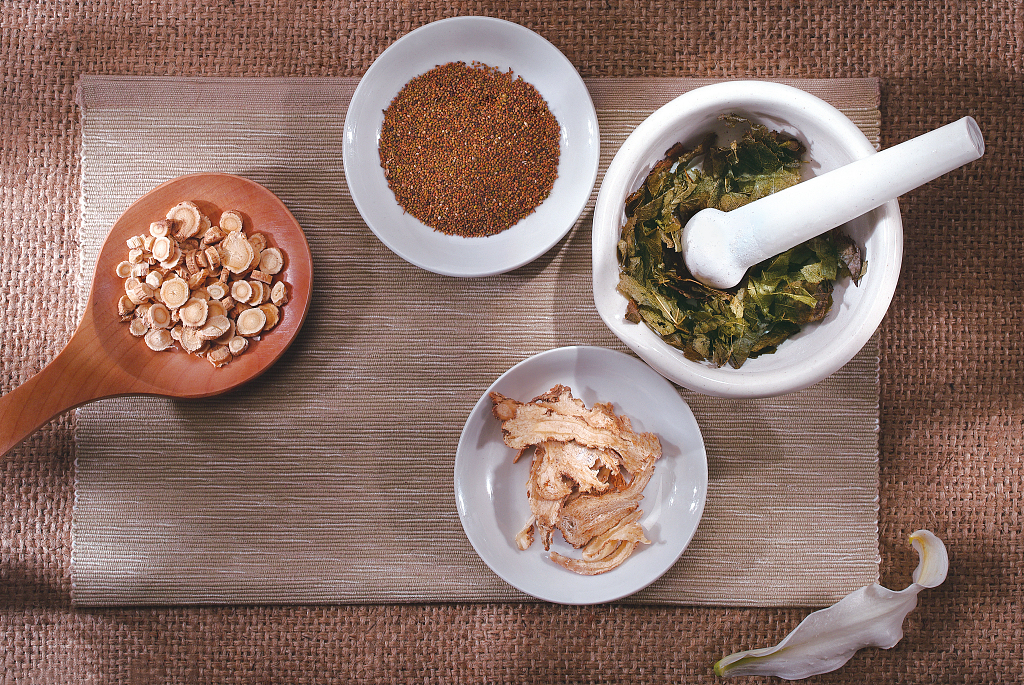 1Spleen and Stomach Yang DeficiencyCaused by excessive consumption of cold foods or kidney yang deficiency, leading to insufficient warmth for the earth. Clinical manifestations include abdominal distension, reduced appetite, abdominal fullness that decreases with warmth, preference for warmth and pressure on the abdomen, clear water regurgitation, thin and watery stools, cold limbs, or heaviness in the body, or generalized edema, difficulty urinating, or excessive thin and watery vaginal discharge, and a feeling of heaviness in the lower abdomen with soreness in the waist and abdomen. The tongue is pale and swollen, with a white and slippery coating, and the pulse is deep, slow, and weak. The internal presence of cold and dampness leads to clear water regurgitation, thin stools, and in severe cases, undigested food in stools, difficulty urinating, and edema. Women may experience thin and watery vaginal discharge and a feeling of heaviness in the lower abdomen.Shen Ling Bai Zhu San (Ginseng and Atractylodes Powder), Ren Shen Jian Pi Wan (Ginseng Spleen-Tonifying Pill)Indicated for digestive issues caused by spleen and stomach deficiency, including fullness and discomfort after eating, nausea and vomiting, abdominal pain with loose stools, lack of appetite, and fatigue.2Spleen and Stomach Qi DeficiencyCharacterized by mental fatigue, general weakness, lack of appetite for dairy products, or refusal to eat, accompanied by weight loss, pale complexion, thin and watery stools or stools with remnants of dairy products, pale tongue with a white coating, and weak pulse.Can use Xiang Sha Liu Jun Zi Tang (Aromatic Sand Six Gentlemen Decoction), Shen Ling Bai Zhu San (Ginseng and Atractylodes Powder).
1Spleen and Stomach Yang DeficiencyCaused by excessive consumption of cold foods or kidney yang deficiency, leading to insufficient warmth for the earth. Clinical manifestations include abdominal distension, reduced appetite, abdominal fullness that decreases with warmth, preference for warmth and pressure on the abdomen, clear water regurgitation, thin and watery stools, cold limbs, or heaviness in the body, or generalized edema, difficulty urinating, or excessive thin and watery vaginal discharge, and a feeling of heaviness in the lower abdomen with soreness in the waist and abdomen. The tongue is pale and swollen, with a white and slippery coating, and the pulse is deep, slow, and weak. The internal presence of cold and dampness leads to clear water regurgitation, thin stools, and in severe cases, undigested food in stools, difficulty urinating, and edema. Women may experience thin and watery vaginal discharge and a feeling of heaviness in the lower abdomen.Shen Ling Bai Zhu San (Ginseng and Atractylodes Powder), Ren Shen Jian Pi Wan (Ginseng Spleen-Tonifying Pill)Indicated for digestive issues caused by spleen and stomach deficiency, including fullness and discomfort after eating, nausea and vomiting, abdominal pain with loose stools, lack of appetite, and fatigue.2Spleen and Stomach Qi DeficiencyCharacterized by mental fatigue, general weakness, lack of appetite for dairy products, or refusal to eat, accompanied by weight loss, pale complexion, thin and watery stools or stools with remnants of dairy products, pale tongue with a white coating, and weak pulse.Can use Xiang Sha Liu Jun Zi Tang (Aromatic Sand Six Gentlemen Decoction), Shen Ling Bai Zhu San (Ginseng and Atractylodes Powder).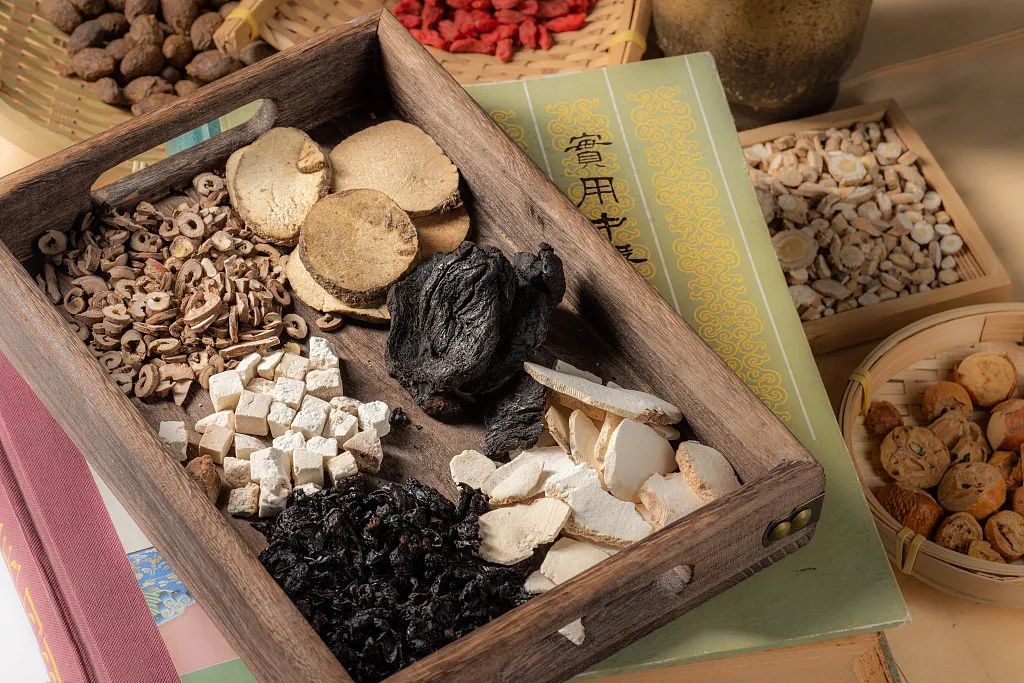 3Yin Deficiency with Excess HeatCharacterized by afternoon tidal fever or night sweats, aversion to clothing, hot palms and soles, or bone steaming heat, irritability, insomnia, vivid dreams, flushed cheeks, night sweats, dry mouth and throat, dry and hard stools, scanty yellow urine, dry red tongue or cracked tongue, little or no coating, and rapid pulse. May also be accompanied by recurrent oral ulcers, pain, dizziness, and lower back soreness and fatigue.Can use Liu Wei Di Huang Wan (Six Flavor Rehmannia Pill), Zhi Bai Di Huang Wan (Anemarrhena and Rehmannia Pill), Yu Nu Jian (Jade Woman Decoction), Gui Qi Shen Kou Fu Ye (Tortoise Shell and Ginseng Oral Liquid), Yu Pan Xiao Ke Pian (Jade Plate Diabetes Tablets).4Dampness Obstructing Spleen YangSpleen and stomach damp-heat syndrome often presents with abdominal distension, fullness, discomfort, nausea, lack of appetite, dry mouth without desire to drink or drinking little, sticky mouth, sticky and unsatisfactory stools or constipation, pale red or red tongue, yellow and greasy coating, burning pain in the abdomen, and sour regurgitation. Dry mouth and bitter taste, thirst without desire to drink, sweet and sticky mouth, sour regurgitation after eating sweet foods, heaviness in the body, fatigue, burning pain in the abdomen, and sour regurgitation.Can use Yin Chen Wu Ling San (Artemisia and Five-Ingredient Powder), Ge Gen Qin Lian Tang (Pueraria, Scutellaria, and Coptis Decoction).5. Recommended Four Massage Techniques for Spleen and Stomach Regulation
3Yin Deficiency with Excess HeatCharacterized by afternoon tidal fever or night sweats, aversion to clothing, hot palms and soles, or bone steaming heat, irritability, insomnia, vivid dreams, flushed cheeks, night sweats, dry mouth and throat, dry and hard stools, scanty yellow urine, dry red tongue or cracked tongue, little or no coating, and rapid pulse. May also be accompanied by recurrent oral ulcers, pain, dizziness, and lower back soreness and fatigue.Can use Liu Wei Di Huang Wan (Six Flavor Rehmannia Pill), Zhi Bai Di Huang Wan (Anemarrhena and Rehmannia Pill), Yu Nu Jian (Jade Woman Decoction), Gui Qi Shen Kou Fu Ye (Tortoise Shell and Ginseng Oral Liquid), Yu Pan Xiao Ke Pian (Jade Plate Diabetes Tablets).4Dampness Obstructing Spleen YangSpleen and stomach damp-heat syndrome often presents with abdominal distension, fullness, discomfort, nausea, lack of appetite, dry mouth without desire to drink or drinking little, sticky mouth, sticky and unsatisfactory stools or constipation, pale red or red tongue, yellow and greasy coating, burning pain in the abdomen, and sour regurgitation. Dry mouth and bitter taste, thirst without desire to drink, sweet and sticky mouth, sour regurgitation after eating sweet foods, heaviness in the body, fatigue, burning pain in the abdomen, and sour regurgitation.Can use Yin Chen Wu Ling San (Artemisia and Five-Ingredient Powder), Ge Gen Qin Lian Tang (Pueraria, Scutellaria, and Coptis Decoction).5. Recommended Four Massage Techniques for Spleen and Stomach Regulation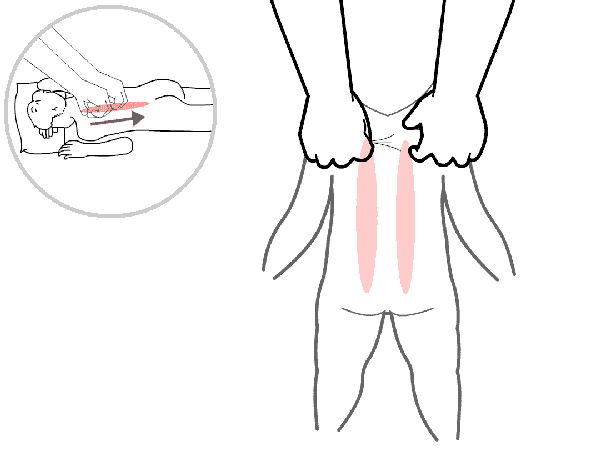 1Back PinchingThe back pinching technique is usually used for children but is equally effective for adults, suitable for patients with indigestion, halitosis, stomach bloating, stomach pain, diarrhea, fatigue, and weakness. Pinch 1-2 times daily, and persistence for one week will yield results.Method: First, gently massage the back several times to relax the muscles, then use the thumb, index finger, middle finger, and ring finger to pinch the skin along the spine from bottom to top, alternating hands to twist forward.Pinch three times and lift the skin each time, known as the “pinch three, lift one method.” The amount of skin pinched and the force used should be appropriate, avoiding twisting; the movement should be straight and not slanted.2Abdominal RubbingPlace both hands on either side of the navel and rub up and down until warmth is felt. This method is suitable for patients with stomach bloating and abdominal pain, performed 2-5 times daily. Two inches away from the navel is the Tian Shu point, and this method can stimulate this point to treat acute and chronic gastroenteritis and digestive dysfunction leading to food accumulation, vomiting, diarrhea, and constipation.
1Back PinchingThe back pinching technique is usually used for children but is equally effective for adults, suitable for patients with indigestion, halitosis, stomach bloating, stomach pain, diarrhea, fatigue, and weakness. Pinch 1-2 times daily, and persistence for one week will yield results.Method: First, gently massage the back several times to relax the muscles, then use the thumb, index finger, middle finger, and ring finger to pinch the skin along the spine from bottom to top, alternating hands to twist forward.Pinch three times and lift the skin each time, known as the “pinch three, lift one method.” The amount of skin pinched and the force used should be appropriate, avoiding twisting; the movement should be straight and not slanted.2Abdominal RubbingPlace both hands on either side of the navel and rub up and down until warmth is felt. This method is suitable for patients with stomach bloating and abdominal pain, performed 2-5 times daily. Two inches away from the navel is the Tian Shu point, and this method can stimulate this point to treat acute and chronic gastroenteritis and digestive dysfunction leading to food accumulation, vomiting, diarrhea, and constipation.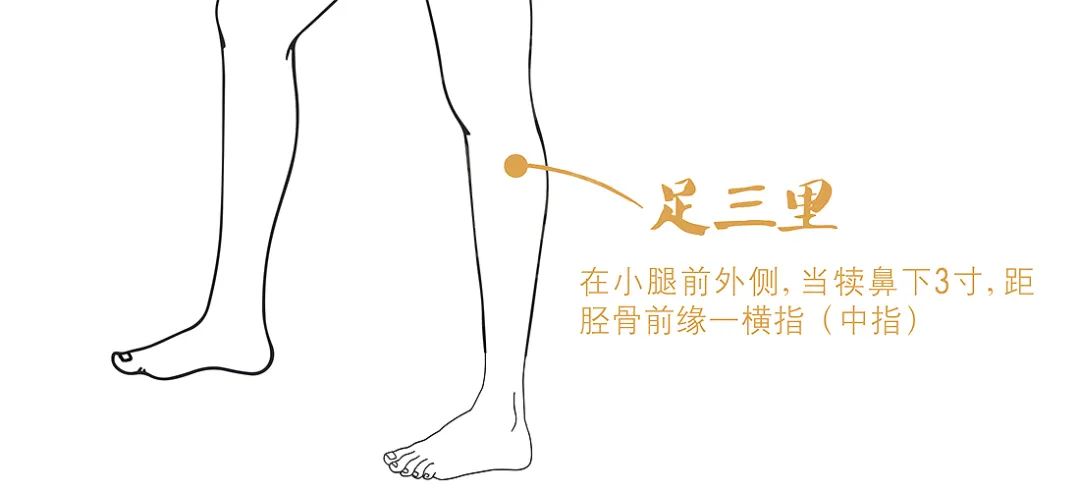 3Pressing and Rubbing Zu San LiZu San Li is a key health point located below the knee. Press and rub 50-100 times daily to strengthen the spleen and stomach, regulate qi, and promote circulation, suitable for various types of spleen and stomach disorders.4Moxibustion for Qi Tonification and Spleen NourishmentIndividuals who often wheeze may have kidney yang deficiency, leading to difficulty in inhaling, resulting in symptoms of wheezing and shortness of breath. To improve this condition, moxibustion and dietary therapy can be employed to enhance physical capacity.
3Pressing and Rubbing Zu San LiZu San Li is a key health point located below the knee. Press and rub 50-100 times daily to strengthen the spleen and stomach, regulate qi, and promote circulation, suitable for various types of spleen and stomach disorders.4Moxibustion for Qi Tonification and Spleen NourishmentIndividuals who often wheeze may have kidney yang deficiency, leading to difficulty in inhaling, resulting in symptoms of wheezing and shortness of breath. To improve this condition, moxibustion and dietary therapy can be employed to enhance physical capacity.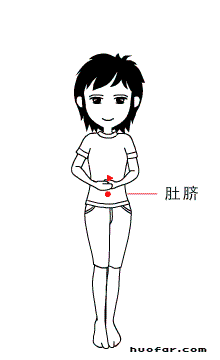 5Navel RubbingPlace one palm or the base of the palm on the navel, and the other hand presses the back of the hand, rotating in a clockwise direction for about 5 minutes, 1-2 times daily. This method can warm yang, dispel cold, tonify qi and blood, strengthen the spleen and stomach, and aid digestion, commonly used for indigestion, stomach cold, abdominal bloating, abdominal pain, diarrhea, and constipation.6. Foods Beneficial for the Spleen and Stomach
5Navel RubbingPlace one palm or the base of the palm on the navel, and the other hand presses the back of the hand, rotating in a clockwise direction for about 5 minutes, 1-2 times daily. This method can warm yang, dispel cold, tonify qi and blood, strengthen the spleen and stomach, and aid digestion, commonly used for indigestion, stomach cold, abdominal bloating, abdominal pain, diarrhea, and constipation.6. Foods Beneficial for the Spleen and Stomach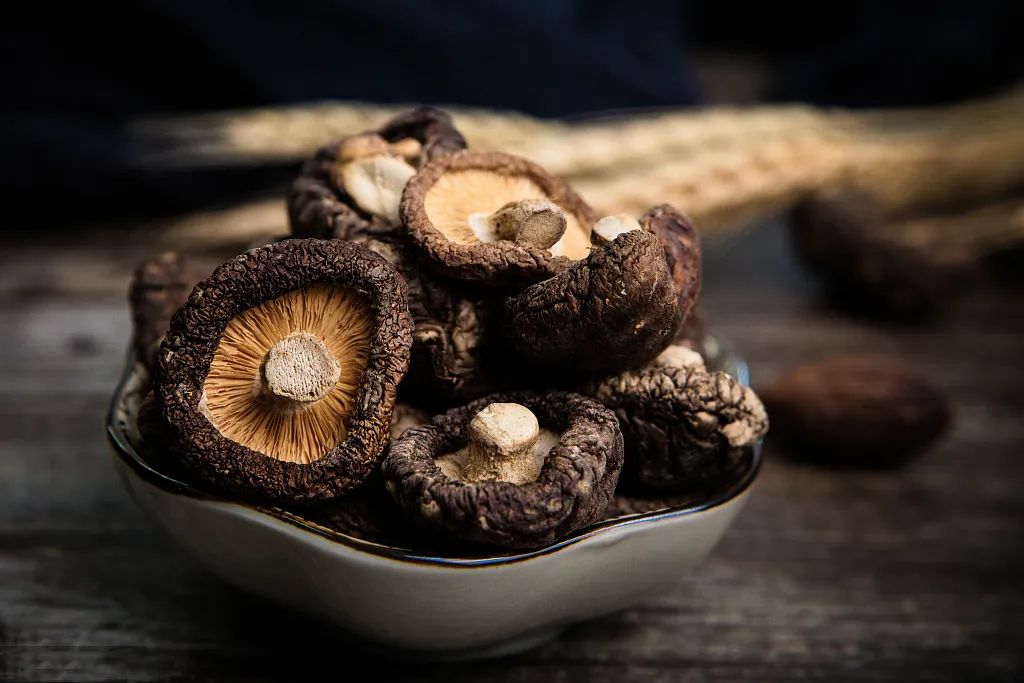 1Shiitake MushroomsSweet in flavor and neutral in nature. Functions: Benefits stomach qi, alleviates rashes. Suitable for spleen and stomach weakness, poor appetite, and fatigue. It is a food that can cause reactions, so it should be avoided in cases of measles, skin diseases, and allergic conditions.2Sweet PotatoesSweet in flavor and neutral in nature, entering the spleen and stomach channels. Functions: Tonifies spleen and stomach, boosts energy, and regulates the intestines. Suitable for spleen and stomach weakness, thinness, fatigue, and poor appetite. Excessive consumption may lead to acid reflux and gastrointestinal bloating.3ChestnutsSweet in flavor and warm in nature, entering the spleen, stomach, and kidney channels. Functions: Tonifies spleen, strengthens stomach, nourishes kidneys, and stops bleeding. Suitable for spleen deficiency with poor appetite and diarrhea. Should be avoided in cases of qi stagnation and abdominal bloating.
1Shiitake MushroomsSweet in flavor and neutral in nature. Functions: Benefits stomach qi, alleviates rashes. Suitable for spleen and stomach weakness, poor appetite, and fatigue. It is a food that can cause reactions, so it should be avoided in cases of measles, skin diseases, and allergic conditions.2Sweet PotatoesSweet in flavor and neutral in nature, entering the spleen and stomach channels. Functions: Tonifies spleen and stomach, boosts energy, and regulates the intestines. Suitable for spleen and stomach weakness, thinness, fatigue, and poor appetite. Excessive consumption may lead to acid reflux and gastrointestinal bloating.3ChestnutsSweet in flavor and warm in nature, entering the spleen, stomach, and kidney channels. Functions: Tonifies spleen, strengthens stomach, nourishes kidneys, and stops bleeding. Suitable for spleen deficiency with poor appetite and diarrhea. Should be avoided in cases of qi stagnation and abdominal bloating. 4Chinese YamSweet in flavor and neutral in nature, entering the spleen, lung, and kidney channels. Functions: Tonifies qi, strengthens spleen, nourishes yin, and benefits lungs, and solidifies essence. Suitable for spleen qi deficiency, poor appetite, and chronic diarrhea. Should be avoided in cases of excessive dampness and qi stagnation.5Hyacinth BeansSweet in flavor and slightly warm in nature, entering the spleen and stomach channels. Functions: Strengthens spleen, transforms dampness, and clears heat. Suitable for spleen deficiency with excessive dampness, poor appetite, and loose stools. Should be avoided in cases of qi stagnation and abdominal bloating.6Red DatesSweet in flavor and warm in nature, entering the spleen and stomach channels. Functions: Tonifies spleen and stomach, nourishes blood, and calms the spirit. Suitable for spleen and stomach weakness, poor appetite, and fatigue. Should be avoided in cases of qi stagnation, damp-heat, and constipation.
4Chinese YamSweet in flavor and neutral in nature, entering the spleen, lung, and kidney channels. Functions: Tonifies qi, strengthens spleen, nourishes yin, and benefits lungs, and solidifies essence. Suitable for spleen qi deficiency, poor appetite, and chronic diarrhea. Should be avoided in cases of excessive dampness and qi stagnation.5Hyacinth BeansSweet in flavor and slightly warm in nature, entering the spleen and stomach channels. Functions: Strengthens spleen, transforms dampness, and clears heat. Suitable for spleen deficiency with excessive dampness, poor appetite, and loose stools. Should be avoided in cases of qi stagnation and abdominal bloating.6Red DatesSweet in flavor and warm in nature, entering the spleen and stomach channels. Functions: Tonifies spleen and stomach, nourishes blood, and calms the spirit. Suitable for spleen and stomach weakness, poor appetite, and fatigue. Should be avoided in cases of qi stagnation, damp-heat, and constipation.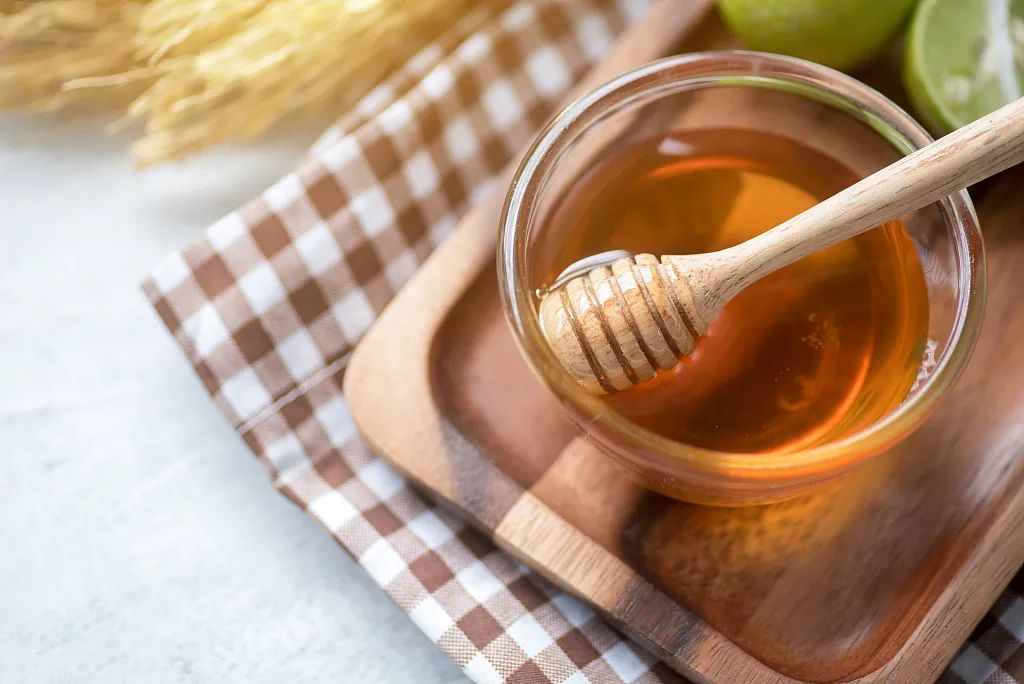 7Honey
7Honey
Sweet in flavor and neutral in nature, entering the spleen, lung, and large intestine channels. Functions: Tonifies spleen, alleviates urgency, moistens lungs, stops cough, and promotes bowel movements. Suitable for spleen and stomach weakness, stomach pain, fluid deficiency, and constipation. Should be avoided in cases of dampness, damp-heat, abdominal bloating, vomiting, and loose stools; not suitable to be consumed with scallions or lettuce.
Recommended Products👇
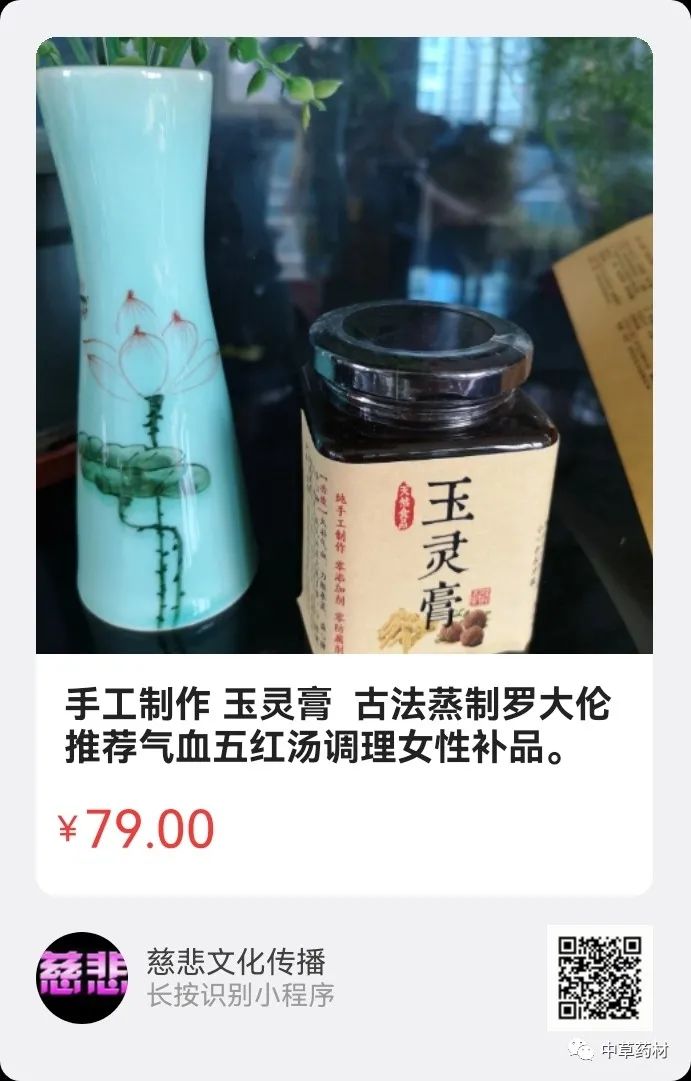
8CowpeasSweet in flavor and neutral in nature, entering the spleen and kidney channels. Functions: Strengthens spleen and nourishes kidneys. Suitable for spleen and stomach weakness, diarrhea, and vomiting. Should be avoided in cases of qi stagnation and constipation.7. Importance of Scientific Exercise for Spleen and Stomach Health The spleen governs the four limbs, and appropriate physical exercise is beneficial for the spleen and stomach.From the perspective of TCM, the meridian system distributes throughout the limbs, so appropriate physical exercise can promote the flow of qi, positively affecting the spleen and stomach’s function.Generally, individuals with strong spleen and stomach function also have well-developed limb muscles. For women, those with healthy spleen and stomach often have fuller breasts, as the stomach meridian’s pathway passes through the nipples. A strong spleen and stomach function and sufficient qi in the stomach meridian are crucial for breast development and fullness.
The spleen governs the four limbs, and appropriate physical exercise is beneficial for the spleen and stomach.From the perspective of TCM, the meridian system distributes throughout the limbs, so appropriate physical exercise can promote the flow of qi, positively affecting the spleen and stomach’s function.Generally, individuals with strong spleen and stomach function also have well-developed limb muscles. For women, those with healthy spleen and stomach often have fuller breasts, as the stomach meridian’s pathway passes through the nipples. A strong spleen and stomach function and sufficient qi in the stomach meridian are crucial for breast development and fullness.
If your spleen and stomach function poorly, consider exercising, especially the legs, which can provide good stimulation to the spleen meridian in the calves. Studies show that moving the toes can nourish the spleen and stomach.
Recommended Products👇
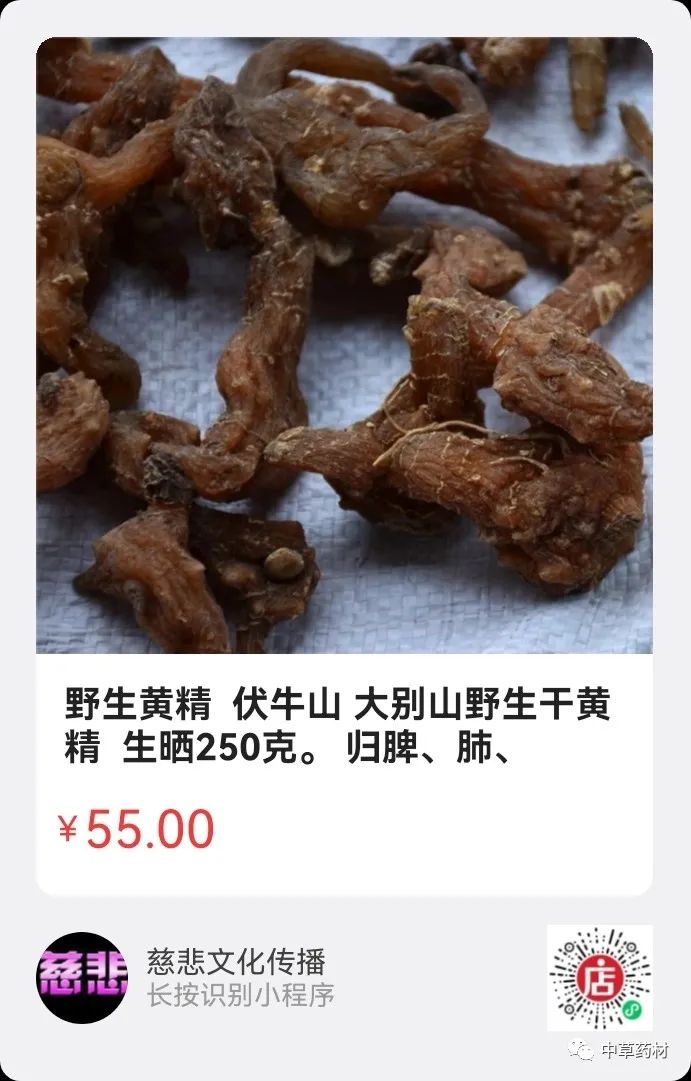
It is best to choose gentle, low-intensity, small amounts of exercise that can be sustained. After exercise, a slight sweat should be produced, and the muscles should feel relaxed, avoiding excessive fatigue. Intense exercise that leads to excessive sweating is not suitable, as it consumes qi and damages fluids, exacerbating symptoms of shortness of breath and fatigue, and reducing immune function.

